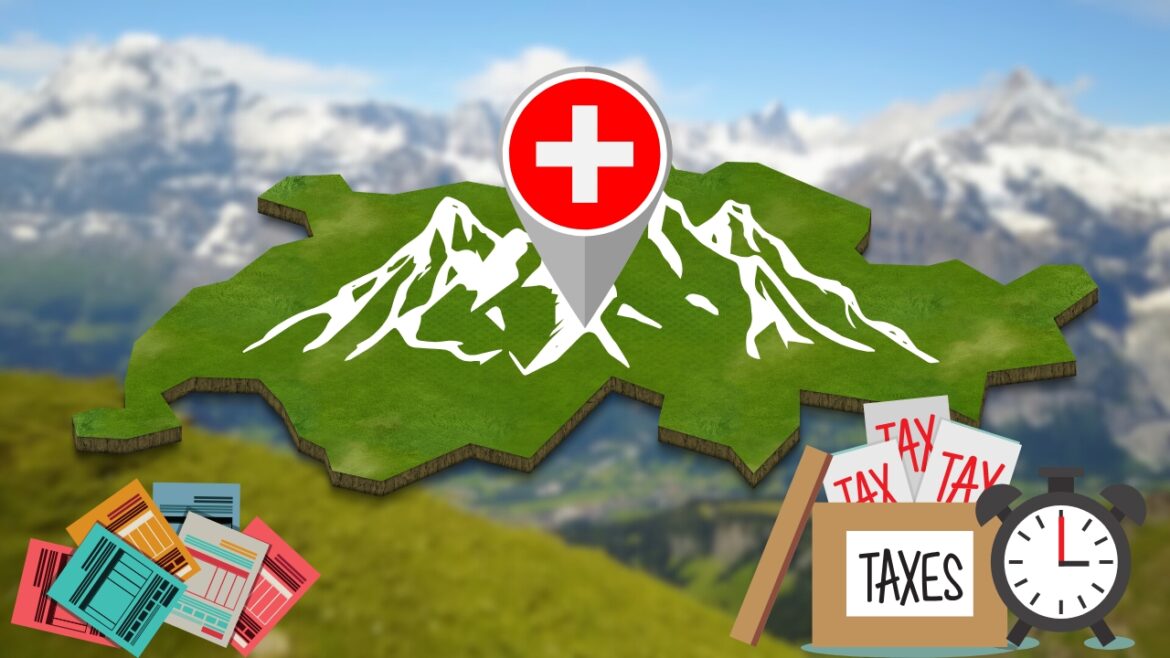Living in Switzerland as a foreign resident is an incredible experience, but it also comes with its fair share of responsibilities—taxes being one of the most important.
Swiss tax laws might seem daunting at first glance, especially with the country’s decentralized system, where taxes are levied at federal, cantonal, and communal levels.
But don’t worry! I’m here to help you make sense of the most crucial elements you’ll need to know to stay on top of your tax game.
Let’s break it down step by step, focusing on what affects you most as a foreign resident.
1. Tax Residency Is the Key to It All
One of the first questions you might be asking yourself is, “Am I considered a tax resident in Switzerland?” Your residency status is essential because it determines how and where you’ll be taxed.
What Makes You a Tax Resident?
Simply put, if you spend more than 90 days in Switzerland (or 30 days if you’re employed), you’re considered a tax resident. It’s as straightforward as that!
The type of residence permit you hold—be it L, B, or C—also plays a role in shaping your tax obligations. As a resident, your global income and assets will need to be declared in Switzerland.
But there’s good news. In some cases, foreign real estate and certain assets could be exempt from Swiss taxes, depending on where they’re located and how they’re classified. Still, keep in mind that Switzerland taxes residents on their worldwide income.
So, it’s critical to assess which parts of your income and wealth fall under Swiss jurisdiction.
For more detailed information on determining your tax residency status and how it impacts your obligations, you can visit SimpleTax for a comprehensive guide.
2. Swiss Taxes
Now, let’s talk about what types of taxes you’ll actually face as a foreign resident in Switzerland.

Income Tax
The income tax situation in Switzerland is quite unique because it’s levied at three levels: federal, cantonal, and communal. The rates vary, which means your location within Switzerland can significantly impact how much you pay.
For example, if you’re living in Zurich, your income tax could range anywhere from around 5% to over 30%. Meanwhile, in Zug, one of the most tax-friendly cantons, your rates might be much lower. It’s all based on your income and where you call home.
On top of that, there’s good news for investors. If you’ve got qualifying investments, dividends might be subject to reduced taxation, and in some instances, capital gains on privately held assets (like stocks) are exempt from taxes altogether.
Wealth Tax
Wealth tax is another consideration, but unlike income tax, this one is only levied at the cantonal and communal levels.
Again, the amount you pay will depend on where you live, and the rates typically hover between 0.1% and 0.9% of your net global wealth. Keep in mind, real estate located outside of Switzerland is generally exempt.
Withholding Tax (Quellensteuer)
For those who don’t hold a C permit, the Swiss government has made things a little easier by introducing withholding tax. If you’re in this category, your employer will deduct income tax from your salary before you even see it.
The amount deducted depends on factors such as your marital status and the number of dependents you have.
However, if your gross income exceeds CHF 10,000 monthly, you may still need to file an annual tax return, even if your employer is deducting tax at source.
3. Deductions and Tax Reductions
Now let’s talk about something a bit more positive: tax deductions! Switzerland provides plenty of opportunities to reduce the taxes you owe, especially if you know what’s available to you.
Personal Deductions
Some of the most common deductions include:
- Contributions to social security and pension funds
- Health insurance premiums
- Costs associated with dependents
Depending on the canton you live in, you might also qualify for deductions on education expenses, debt interest, and voluntary contributions to a third-pillar pension fund (known as Pillar 3a). Taking advantage of these deductions can lead to substantial tax savings.
Special Expat Deductions
For expatriates, there are additional benefits. If you’re working in a leadership role or as a specialist and your assignment to Switzerland is temporary, you could be eligible for special deductions.
These often cover things like:
- Moving expenses
- Accommodation costs
- Private school fees for children
The goal is to make your temporary stay in Switzerland as tax-friendly as possible, so make sure to explore what applies to your situation.
4. Location, Location, Location (Cantonal Tax Variations)

Where you live in Switzerland matters more than you might think when it comes to taxes. Cantonal and communal tax rates vary significantly, meaning that two people with the same income could have wildly different tax bills depending on where they reside.
For example:
- Cantons like Zug and Schwyz are known for their low tax rates, making them popular among high-income earners.
- Meanwhile, places like Geneva and Neuchâtel are on the pricier side when it comes to taxes.
If you have flexibility in where you choose to live, this could be a significant factor in lowering your overall tax burden.
5. Double Taxation Treaties
Switzerland has an extensive network of Double Taxation Treaties (DTTs) with many countries around the world. These treaties are crucial because they ensure you aren’t taxed twice on the same income—once in Switzerland and again in your home country.
If you’re a U.S. citizen, this part can get tricky because U.S. tax laws still apply even when you live abroad. That’s where the treaties come into play, potentially reducing your tax liability and helping you avoid paying taxes on the same income in both countries.
6. Filing Tax Returns (When and How?)
Not everyone has to file a tax return, and that’s one of the perks of Switzerland’s tax system. If your employer is deducting withholding tax and your income is less than CHF 120,000 per year, your obligations may already be covered.
However, if you earn more than that or want to claim deductions (like for a mortgage or Pillar 3a contributions), you’ll need to file a return. The good news is that filing a tax return gives you the chance to lower your taxes by claiming eligible deductions.
7. Inheritance and Gift Taxes

Inheritance and gift taxes exist only at the cantonal and communal levels, so they can vary greatly. The rates depend on the relationship between the donor and the recipient, and in many cantons, spouses and children may be exempt from these taxes.
If you’re considering estate planning or have received a gift, it’s worth reaching out to your local tax authorities to see what specific rules apply in your canton.
Managing finances as an international resident, especially when overseeing business operations, means understanding varied tax rules and organizing accounting efficiently to stay compliant.
Finding Your Tax Balance
Switzerland’s tax system, though decentralized and layered, doesn’t have to be overwhelming.
As a foreign resident, your key takeaways should be:
- Know your residency status and the implications for your worldwide income.
- Take advantage of deductions and expat benefits to lower your taxable income.
- Keep an eye on cantonal tax rates, as where you live can make a significant difference.
- Be aware of double taxation treaties to avoid being taxed twice on the same income.
If you’re still feeling unsure about any aspects of your taxes, don’t hesitate to reach out to a professional. A tax advisor specialized in Swiss tax law for expatriates can help ensure you’re complying with regulations while maximizing your potential savings.
At the end of the day, Swiss taxes are manageable if you stay informed and take advantage of the resources and deductions available to you.








